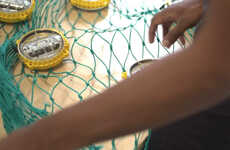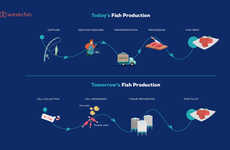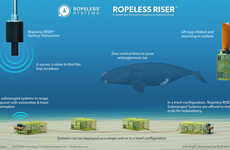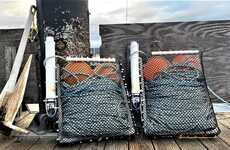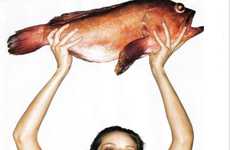
Using Sound & Pavlov's Law
Dee Sandin — March 26, 2008 — Lifestyle
Once again, with the idea of restocking our depleting resources, scientists at the Marine Biological Laboratory at Wood's Hole, Mass. are testing a plan to train fish to catch themselves using sound.
The fish swim into a net when they hear a tone signaling feeding time. The system could eventually allow depleted fish like black sea bass to be released into the open ocean, grow to market size, then swim into an underwater cage at harvest time when they hear the signal. This way, farmed fish might be better acclimated to the wild when they can be called to feed every few days. The big goal is to help with the costs of fish farming, an important source of the world's seafood. Trained fish return after several days of feeding saving the farms money on feed and reducing the fish waste released in concentrated areas.
According to the Associated Press: "What's next, teaching them to coat themselves in batter and hop inside a fryer?"
The fish swim into a net when they hear a tone signaling feeding time. The system could eventually allow depleted fish like black sea bass to be released into the open ocean, grow to market size, then swim into an underwater cage at harvest time when they hear the signal. This way, farmed fish might be better acclimated to the wild when they can be called to feed every few days. The big goal is to help with the costs of fish farming, an important source of the world's seafood. Trained fish return after several days of feeding saving the farms money on feed and reducing the fish waste released in concentrated areas.
According to the Associated Press: "What's next, teaching them to coat themselves in batter and hop inside a fryer?"
Trend Themes
1. Self-training Animals - Opportunity for industries to innovate with self-training techniques for various animals for higher efficiency and cost savings.
2. Automated Animal Husbandry - Disruptive innovation opportunities for industries in the agricultural sector to automate animal husbandry for increased efficiency and precision.
3. Smart Fisheries Management - Opportunity for the fishing industry to use advanced technologies to manage stocks and optimize harvesting practices.
Industry Implications
1. Aquaculture - Aquaculture companies can benefit from using technology to optimize feeding and reduce waste.
2. Agriculture - Technologies used in automated animal husbandry can be applied to other types of farming, such as poultry or livestock, for greater efficiency.
3. Fishing - Fishing companies can explore the use of smart technologies and data analytics to sustainably manage fish stocks and reduce waste.
2.1
Score
Popularity
Activity
Freshness

